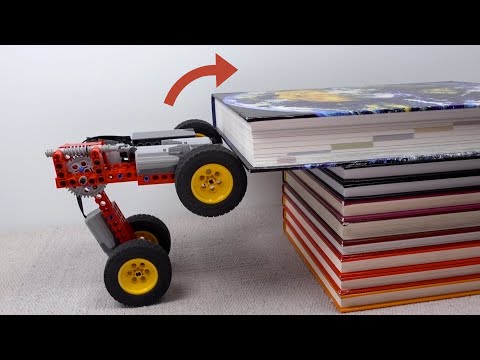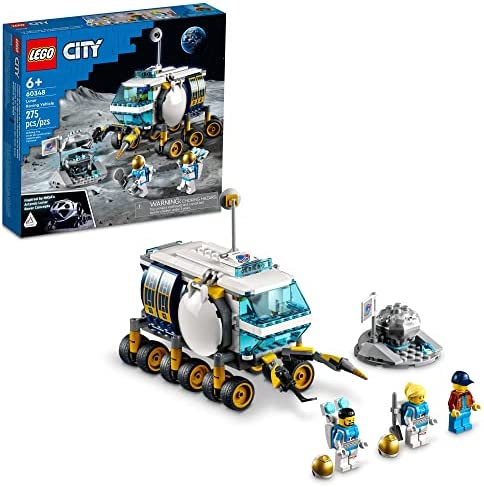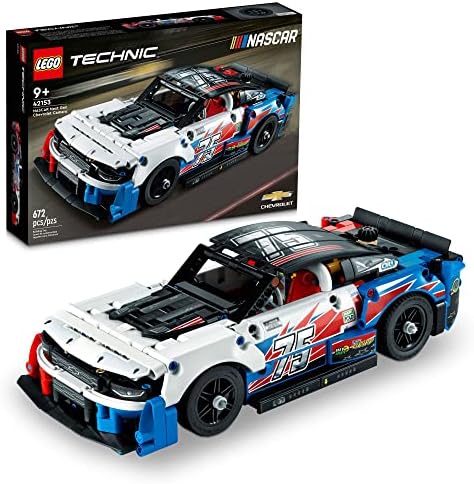Unleashing the Ultimate Lego Car: Conquering Obstacles with Precision
Making Lego Car CLIMB Obstacles: Discover the ultimate thrill of engineering as you witness the awe-inspiring power of a Lego car conquering obstacles with skill and precision! Unleash your creativity and problem-solving abilities by crafting a dynamic Lego vehicle that defies gravity. This mind-blowing project allows you to push the boundaries of what is possible, as you design and build a car capable of scaling towering obstacles with ease. Marvel at the intricate mechanisms and intricate details as your creation overcomes each challenge, showcasing the true potential of Lego engineering. With every twist and turn, witness firsthand the incredible resilience and adaptability of your masterpiece. Prepare to embark on an exhilarating journey with the Lego Car CLIMB Obstacles, where imagination meets innovation and every obstacle becomes an opportunity for triumph.
Video Source : Brick Experiment ChannelThe Art of Making Lego Car CLIMB Obstacles
| Obstacle | Description | Technique |
|---|---|---|
| Ramp | A steep incline that requires the car to ascend | Use large, sturdy wheels and add weight to increase traction |
| Stairs | A series of steps that the car must navigate | Create a suspension system to absorb shocks and enable smooth traversal |
| Mud Pit | A wet and muddy terrain that hampers movement | Fit the car with off-road tires, ensuring deep treads for enhanced grip |
| Bridge | A narrow pathway suspended above a gap | Design a lightweight and flexible chassis to maintain balance while crossing |
| Rocky Terrain | An uneven surface with rocks and boulders | Incorporate a four-wheel-drive system for better traction and maneuverability |
| Sand Dunes | A soft and shifting sandy landscape | Fit the car with wide tires to increase surface area and prevent sinking |

Introduction
Lego cars have always been a favorite among both children and adults. Building and customizing these cars allows for endless creativity and fun. One exciting challenge that Lego enthusiasts often undertake is making their Lego cars climb obstacles. This takes the experience to a whole new level, testing the limits of what these little plastic bricks can do. In this article, we will explore the steps and techniques involved in making a Lego car climb obstacles, allowing you to impress your friends with your engineering skills.
Choosing the Right Lego Car
Before you can start building a Lego car that can climb obstacles, it is important to choose the right base model. Look for a car that has a sturdy structure and enough ground clearance to accommodate additional elements. This will allow you to easily modify and add the necessary components for obstacle climbing.
Modifying the Suspension
Suspension plays a crucial role in a Lego car’s ability to climb obstacles. By modifying the suspension, you can enhance the car’s traction and stability. One simple modification involves replacing the standard Lego wheels with larger ones that have better grip. This will provide more traction, allowing the car to climb over obstacles with ease. Additionally, reinforcing the suspension with additional Lego bricks can help improve stability, especially when navigating uneven surfaces.
Adding Power Functions
If you want your Lego car to conquer obstacles, adding power functions can greatly enhance its performance. Power functions, such as motors and gears, can provide the necessary torque and power to climb steep inclines. By attaching a motor to one or more of the wheels, you can create a driving force that propels the car forward, helping it overcome obstacles that would otherwise be too challenging.
Utilizing Weight Distribution
Weight distribution plays a crucial role in a Lego car’s ability to climb obstacles. By strategically placing additional weight on the car, you can improve its traction and stability. One technique is to add weights near the rear wheels, as this will help improve traction and prevent the car from tipping over when ascending steep inclines. Experiment with different weight distributions to find the optimal balance for your Lego car.
Designing Specialized Attachments
To enhance your Lego car’s obstacle-climbing capabilities, you can design specialized attachments that aid in the process. For example, you can create a front attachment that acts as a bulldozer blade, pushing away smaller obstacles in its path. Additionally, you can design a rear attachment with a hook or claw that allows the car to grip onto objects and pull itself up. The possibilities are endless when it comes to designing specialized attachments that cater to your specific obstacle-climbing needs.
Conclusion
Making a Lego car that can climb obstacles is an exciting challenge that requires creativity, problem-solving skills, and a little bit of engineering know-how. By modifying the suspension, adding power functions, utilizing weight distribution, and designing specialized attachments, you can transform a regular Lego car into a powerful obstacle-climbing machine. So, gather your bricks, unleash your creativity, and embark on this thrilling journey of making a Lego car that can conquer any obstacle in its path.




